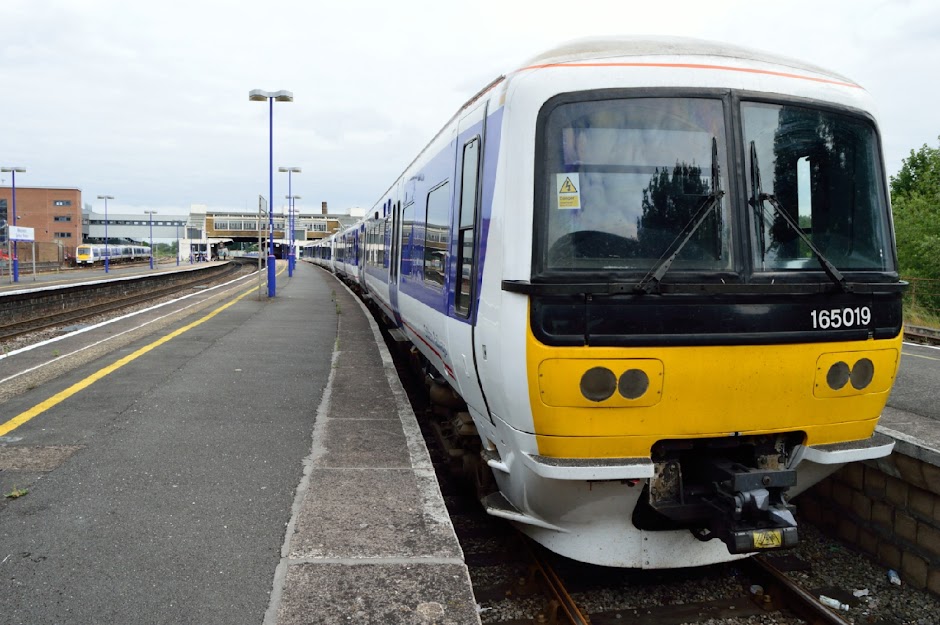Plain, Ugly...But Oh! So Powerful. |
| Southern Railway Q1 Class Steam Locomotive 0-6-0 C1 33001 |
How the UK Southern Railway's powerful but austere-looking 0-6-0 Q1 freight steam locomotive came to play an important part in British Railways history.
Due
to the vastly increased amount of railway freight traffic to English
Channel ports as a direct result of World War 2, the steam locomotive fleet
of the Southern Railway was, even with the best will in the world,
basically strained to its limits. The SR was, after all, a regional
railway concerned with providing passenger train services as opposed
to freight.
Obviously,
something had to be done to ease this chronic situation.
Designer
Oliver Bulleid, successor to Richard Maunsell, fully recognised the
problem and set out to resolve it. The result was that by 1942 he
had produced the extraordinary-looking, many would say ugly, Q1 Class
0-6-0 steam locomotive.
Incidentally, the Q1 would be the last 0-6-0 locomotive to be designed and manufactured for the British railway network.
Incidentally, the Q1 would be the last 0-6-0 locomotive to be designed and manufactured for the British railway network.
Bulleid
accepted that as a consequence of wartime scarcities he would need to
use as little metal as possible in the design of his radical Q1 locomotive.
To
this end he did away with fitting wheel splashers and running boards,
which up until this point traditionally sat below the boiler casing.
In addition to this he incorporated into his construction the use of
lightweight, double-disc, American-inspired 'box-pok' wheels. A
feature he had fitted to his earlier steam locomotive the Southern Railway
'Merchant Navy Pacific', introduced in June 1941, followed by the
'West Country' class in May 1945.
 |
| Q1 Class 0-6-0 33028 |
In
a further effort to reduce overall weight, O.V. Bulleid, employed a
totally radical idea in the world of locomotive production, and
that was in the area of boiler cladding.
On
the Q1 he employed the use of a lightweight fibreglass known as
Idaglass, cheap and plentiful during the war years which, instead of
being traditionally wrapped around the boiler, was in fact supported
by the main frame.
Apart
from the 'box-pok' wheels, the Q1 had something else in common with
the 4-6-2 'Merchant Navy' and 'West Country' locos; the exterior
surfaces could by superficially cleaned simply by running the loco through a carriage cleaning facility.
The
first completed Q1 locomotive, numbered C1 (C standing for three
axles), later to be renumbered 33001 in November 1950, appeared at
London's Charing Cross station on the 6th
May 1942 for inspection by a group of Southern Railway's directors – which
no doubt raised a few quizzical eyebrows.
Designer
William Stanier of London Midland and Scottish Railway was so amused
on seeing a photograph of the Q1 that he asked, "Where do you
put the key?"
Soon
after its debut at Charing Cross, freight train tests began between
Norwood, south London and Chichester in West Sussex.
Within
a few months another Q1, C3 (33003), was performing well during
comparative trials with Southern Railway steam locomotive Class S15 4-6-0 No 842 between Woking,
Surrey and Basingstoke in Hampshire. During this time C1, hauling a
mixed freight train of 1,000 tons, easily covered the same 24 miles
with a reduction in the scheduled time by 8 minutes.
Brighton
and Ashford Works were elected to construct the 40-strong Q1 class.
Numbers C1-16 and C37-40 produced at Brighton and the remainder,
C17-36, at Ashford – all delivered during 1942.
Generally
the Q1s worked the Southern Railway's Western and Central Section,
though they were also seen at Tonbridge, Kent; Eastleigh, Hampshire;
Three Bridges, Sussex and Hither Green south-east London. However,
the largest numbers of the class were to be found at Guildford,
Surrey and Feltham, south-west London.
After
21 years of reliable service on the Southern Railway, hauling
countless freight and passenger trains and a large number of
'specials', they had earned the nicknames, 'Biscuit Tins', 'Biscuit
Barrels', 'Charlies', 'Clockworks', 'Coffee Pots', 'Austerities' and
'Ugly Ducklings' by the train-spotter fraternity.
The
first withdrawn locomotive of the class was 33028 in February 1963,
with the final trio 33006, 33020 and 33027 taken out of service in
January 1966.
The
first production Q1 the most powerful of the 0-6-0 steam locomotive classes, C1 33001, avoided the indignity of ending up in the
scrapyard as was the case for all of its stablemates.
It was rightly
added to the National Collection at York Railway Museum.
On a purely personal note:
As a boy I remember 'spotting' a couple of grimy Q1s on the sidings at Ashford while travelling on a train between Dover Priory station and London's Waterloo East in the late 1950s. I thought at the time that they were really ugly and were my least favourite locos.
Sadly, I have no accurate details of this siting as my spotting books from that time have long since disappeared.
On a purely personal note:
As a boy I remember 'spotting' a couple of grimy Q1s on the sidings at Ashford while travelling on a train between Dover Priory station and London's Waterloo East in the late 1950s. I thought at the time that they were really ugly and were my least favourite locos.
Sadly, I have no accurate details of this siting as my spotting books from that time have long since disappeared.
More steam locomotive 'Photos and History' pages.
Photos and History of King Arthur Class 4-6-0 UK Steam Locomotive
Photos and History of GWR 'City' Class 4-4-0 UK Steam Locomotive
Q1 Loco On YouTube:
Don't forget to subscribe to 'Along These Tracks' to get all new posts and updates sent directly to you.








No comments:
Post a Comment